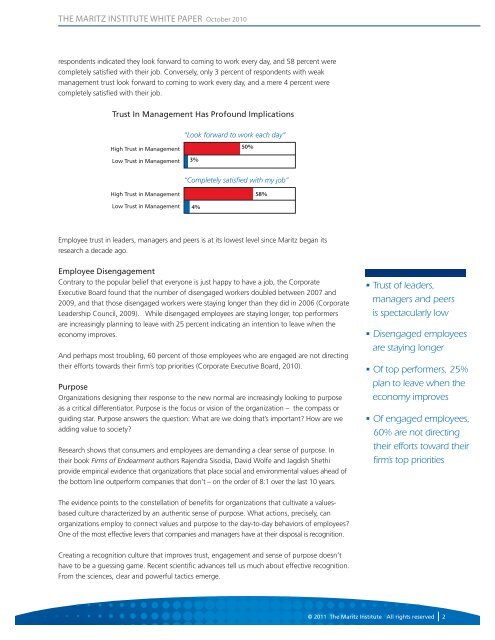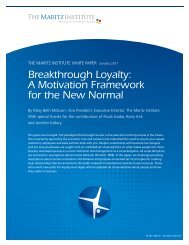The Human Science of Giving Recognition ... - Maritz Institute
The Human Science of Giving Recognition ... - Maritz Institute
The Human Science of Giving Recognition ... - Maritz Institute
You also want an ePaper? Increase the reach of your titles
YUMPU automatically turns print PDFs into web optimized ePapers that Google loves.
THE MARITZ INSTITUTE WHITE PAPER October 2010<br />
respondents indicated they look forward to coming to work every day, and 58 percent were<br />
completely satisfied with their job. Conversely, only 3 percent <strong>of</strong> respondents with weak<br />
management trust look forward to coming to work every day, and a mere 4 percent were<br />
completely satisfied with their job.<br />
Trust In Management Has Pr<strong>of</strong>ound Implications<br />
High Trust in Management<br />
Low Trust in Management<br />
High Trust in Management<br />
Low Trust in Management<br />
“Look forward to work each day”<br />
3%<br />
Employee trust in leaders, managers and peers is at its lowest level since <strong>Maritz</strong> began its<br />
research a decade ago.<br />
Employee Disengagement<br />
Contrary to the popular belief that everyone is just happy to have a job, the Corporate<br />
Executive Board found that the number <strong>of</strong> disengaged workers doubled between 2007 and<br />
2009, and that those disengaged workers were staying longer than they did in 2006 (Corporate<br />
Leadership Council, 2009). While disengaged employees are staying longer, top performers<br />
are increasingly planning to leave with 25 percent indicating an intention to leave when the<br />
economy improves.<br />
And perhaps most troubling, 60 percent <strong>of</strong> those employees who are engaged are not directing<br />
their efforts towards their firm’s top priorities (Corporate Executive Board, 2010).<br />
Purpose<br />
Organizations designing their response to the new normal are increasingly looking to purpose<br />
as a critical differentiator. Purpose is the focus or vision <strong>of</strong> the organization – the compass or<br />
guiding star. Purpose answers the question: What are we doing that’s important? How are we<br />
adding value to society?<br />
Research shows that consumers and employees are demanding a clear sense <strong>of</strong> purpose. In<br />
their book Firms <strong>of</strong> Endearment authors Rajendra Sisodia, David Wolfe and Jagdish Shethi<br />
provide empirical evidence that organizations that place social and environmental values ahead <strong>of</strong><br />
the bottom line outperform companies that don’t – on the order <strong>of</strong> 8:1 over the last 10 years.<br />
<strong>The</strong> evidence points to the constellation <strong>of</strong> benefits for organizations that cultivate a valuesbased<br />
culture characterized by an authentic sense <strong>of</strong> purpose. What actions, precisely, can<br />
organizations employ to connect values and purpose to the day-to-day behaviors <strong>of</strong> employees?<br />
One <strong>of</strong> the most effective levers that companies and managers have at their disposal is recognition.<br />
Creating a recognition culture that improves trust, engagement and sense <strong>of</strong> purpose doesn’t<br />
have to be a guessing game. Recent scientific advances tell us much about effective recognition.<br />
From the sciences, clear and powerful tactics emerge.<br />
50%<br />
“Completely satisfied with my job”<br />
4%<br />
58%<br />
• Trust <strong>of</strong> leaders,<br />
managers and peers<br />
is spectacularly low<br />
• Disengaged employees<br />
are staying longer<br />
• Of top performers, 25%<br />
plan to leave when the<br />
economy improves<br />
• Of engaged employees,<br />
60% are not directing<br />
their efforts toward their<br />
firm’s top priorities<br />
© 2011 <strong>The</strong> <strong>Maritz</strong> <strong>Institute</strong> All rights reserved 2



